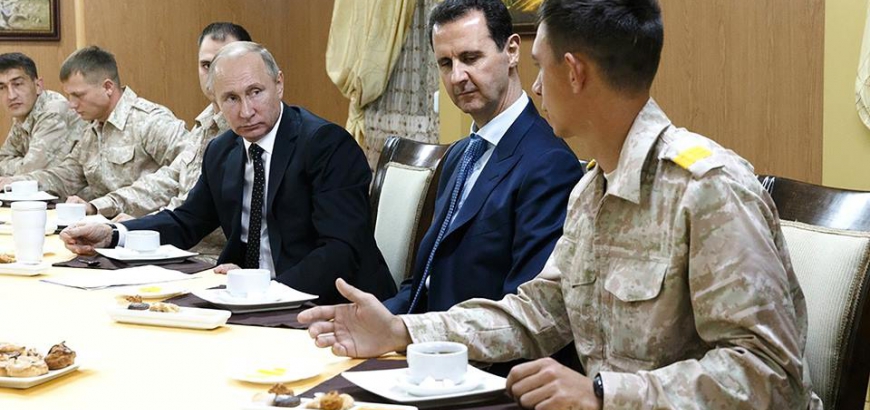Russian President Vladimir Putin’s stop in Syria resembled more of a transit stop when he came to visit President Bashar al-Assad — not in the Al-Muhajireen or Presidential Palace in accordance with customs and traditions, but with Putin inviting Bashar to the Russian house of submission and center of the ruling high commissioner, that is, the Russian Hmeimeem permanent base in the Lattakia countryside, which has become entirely Russian territory where no Syrian has authority, whatever his status.
In order to complete the ritual of displaying Russian control and the subordination of the regime, Bashar was received by Putin in the military base, along with the Russian Defense Minister Sergey Shoygu, and commander of the Russian forces in Syria, Sergei Surovkin, suggesting that “his excellency the president” is now no more than one employee among many in the service of Moscow.
Putin’s surprise visit came on Monday, resembling a transit stop, or a rest station, on his way to Cairo, where he arrived today. During the surprise and sudden visit, Putin was the one to declare that his country will keep a permanent presence in the Tartous and Hmeimeem bases.
Without any consideration for Bashar’s presence, Putin addressed his military command directly, saying: “The defense minister and chief of general staff have ordered to begin withdrawing a group of Russian forces to permanent deployment points [in Russia],” adding that Russia had suffered “sacrifices and losses” during its intervention in Syria.
Despite everything the Moscow and Damascus media have promoted about the strength of their relations and the depth of their alliance, the form of the visit and its rituals were proof that what links Putin and Bashar is no more than the relation between sovereign and servant. What proves this is that Putin has not considered to visit his ally before or during the revolution, and when he chooses to visit for the first time in Syria, he invited Assad in an insulting manner to the heart of his own sectarian stronghold (Hmeimeem is in the Lattakia countryside, no more than 17 km from Qardaha — the hometown of the Assad family).
This article was translated and edited by The Syrian Observer. Responsibility for the information and views set out in this article lies entirely with the author.


